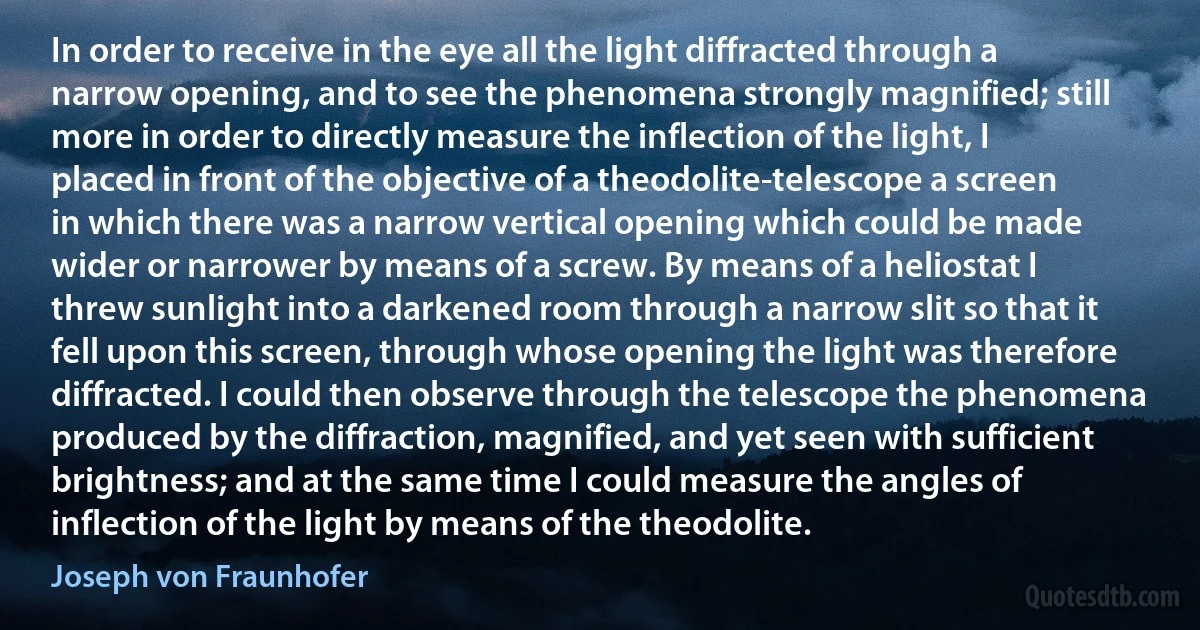
In order to receive in the eye all the light diffracted through a narrow opening, and to see the phenomena strongly magnified; still more in order to directly measure the inflection of the light, I placed in front of the objective of a theodolite-telescope a screen in which there was a narrow vertical opening which could be made wider or narrower by means of a screw. By means of a heliostat I threw sunlight into a darkened room through a narrow slit so that it fell upon this screen, through whose opening the light was therefore diffracted. I could then observe through the telescope the phenomena produced by the diffraction, magnified, and yet seen with sufficient brightness; and at the same time I could measure the angles of inflection of the light by means of the theodolite.
Joseph von FraunhoferRelated topics
diffraction eye fell front inflection light measure narrow objective observe order receive room screw see seen telescope throw time vertical yet meansRelated quotes
On the evening of the 29th, the army fell back to the north end of the Island. The next morning, the enemy advanced upon us in two columns upon the east and west road. Our light troops, commanded by Colonel Livingston and Colonel Laurens, attacked the heads of the columns about seven o'clock in the morning, but were beat back they were reinforced with a regiment upon each road. The enemy still proved too strong. General Sullivan formed the army in order of battle, and resolved to wait their approach upon the ground we were encamped on, and sent orders to the light troops to fall back. The enemy came up and formed upon Quaker Hill, a very strong piece of ground, within about one mile and a quarter of our line. We were well posted, with strong works in our rear, and a strong redoubt in front, partly upon the right of the line.

Nathanael Greene
It is impossible for any man, when the most favourable circumstances concur, to acquire sufficient knowledge and strength of mind to discharge the duties of a king, entrusted with uncontrolled power; how then must they be violated when his very elevation is an insuperable bar to the attainment of either wisdom or virtue; when all the feelings of a man are stifled by flattery, and reflection shut out by pleasure! Surely it is madness to make the fate of thousands depend on the caprice of a weak fellow creature, whose very station sinks him NECESSARILY below the meanest of his subjects! But one power should not be thrown down to exalt another--for all power intoxicates weak man; and its abuse proves, that the more equality there is established among men, the more virtue and happiness will reign in society.

Mary Wollstonecraft
I asked my guide how it was possible the judicious part of them could suffer such incoherent prating? "We are obliged," said he, "to suffer it, because no one knows, when a brother rises up to hold forth, whether he will be moved by the spirit or by folly. In this uncertainty, we listen patiently to every one. We even allow our women to speak in public; two or three of them are often inspired at the same time, and then a most charming noise is heard in the Lord's house." "You have no priests, then?" said I. "No, no, friend," replied the Quaker; "heaven make us thankful!" Then opening one of the books of their sect, he read the following words in an emphatic tone: "'God forbid we should presume to ordain any one to receive the Holy Spirit on the Lord's day, in exclusion to the rest of the faithful!'

Voltaire
The 'new theory of money and the cycle' which is spoken of in the opening paragraph is of course Hayek's. It was from Hayek that I began - where I got to will be seen. Even at the end, I was minimising my differences from Hayek. I could do so because, as I have elsewhere explained (Economic Perspectives, p. 141n), I still thought, like Pigou and Robertson, and Hayek, but by that time unlike Keynes, that 'we were talking about fluctuations, which, since they did not result in complete collapse or complete explosion, could not have engendered an expectation of going on forever. Booms could then be considered as times of high prices, slumps as times of low prices - with regard to some norm, which throughout the which throughout the fluctuations would not be changed, or not much changed'.

John Hicks
The Vice-President's Chamber is adjacent to the Senate Chamber, and so small that to survive it is necessary to keep the door open in order to obtain the necessary cubic feet of air. When the vice-president is in the room [the Capitol Guides] go by with their guests, stop and point him out, as though he were a curiosity.I stood this for about as long as I could, and then went to the door one day, and said: "If you look on me as a wild animal, be kind enough to throw peanuts at me; but if you are really desirous of seeing me, come in and shake hands." In that way I think I restored myself to the position I have always desired to occupy; that of an American, who looks up to nobody, looks down upon nobody, but tries to keep a conscience clean enough that he can look everybody in the face.

Thomas R. Marshall
